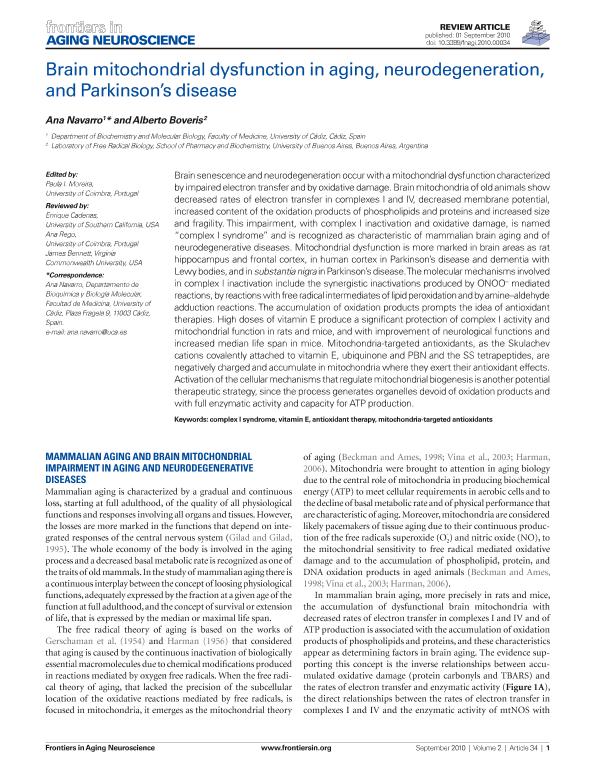Artículo
Brain mitochondrial dysfunction in aging, neurodegeneration, and Parkinson’s disease
Fecha de publicación:
09/2010
Editorial:
Frontiers
Revista:
Frontiers in Aging Neuroscience
ISSN:
1663-4365
Idioma:
Inglés
Tipo de recurso:
Artículo publicado
Clasificación temática:
Resumen
Brain senescence and neurodegeneration occur with a mitochondrial dysfunction characterized by impaired electron transfer and by oxidative damage. Brain mitochondria of old animals show decreased rates of electron transfer in complexes I and IV, decreased membrane potential, increased content of the oxidation products of phospholipids and proteins and increased size and fragility. This impairment, with complex I inactivation and oxidative damage, is named “complex I syndrome” and is recognized as characteristic of mammalian brain aging and of neurodegenerative diseases. Mitochondrial dysfunction is more marked in brain areas as rat hippocampus and frontal cortex, in human cortex in Parkinson's disease and dementia with Lewy bodies, and in substantia nigra in Parkinson's disease. The molecular mechanisms involved in complex I inactivation include the synergistic inactivations produced by ONOO− mediated reactions, by reactions with free radical intermediates of lipid peroxidation and by amine–aldehyde adduction reactions. The accumulation of oxidation products prompts the idea of antioxidant therapies. High doses of vitamin E produce a significant protection of complex I activity and mitochondrial function in rats and mice, and with improvement of neurological functions and increased median life span in mice. Mitochondria-targeted antioxidants, as the Skulachev cations covalently attached to vitamin E, ubiquinone and PBN and the SS tetrapeptides, are negatively charged and accumulate in mitochondria where they exert their antioxidant effects. Activation of the cellular mechanisms that regulate mitochondrial biogenesis is another potential therapeutic strategy, since the process generates organelles devoid of oxidation products and with full enzymatic activity and capacity for ATP production.
Archivos asociados
Licencia
Identificadores
Colecciones
Articulos(OCA HOUSSAY)
Articulos de OFICINA DE COORDINACION ADMINISTRATIVA HOUSSAY
Articulos de OFICINA DE COORDINACION ADMINISTRATIVA HOUSSAY
Citación
Navarro, Ana; Boveris, Alberto Antonio; Brain mitochondrial dysfunction in aging, neurodegeneration, and Parkinson’s disease; Frontiers; Frontiers in Aging Neuroscience; 2; 34; 9-2010; 1-11
Compartir
Altmétricas




